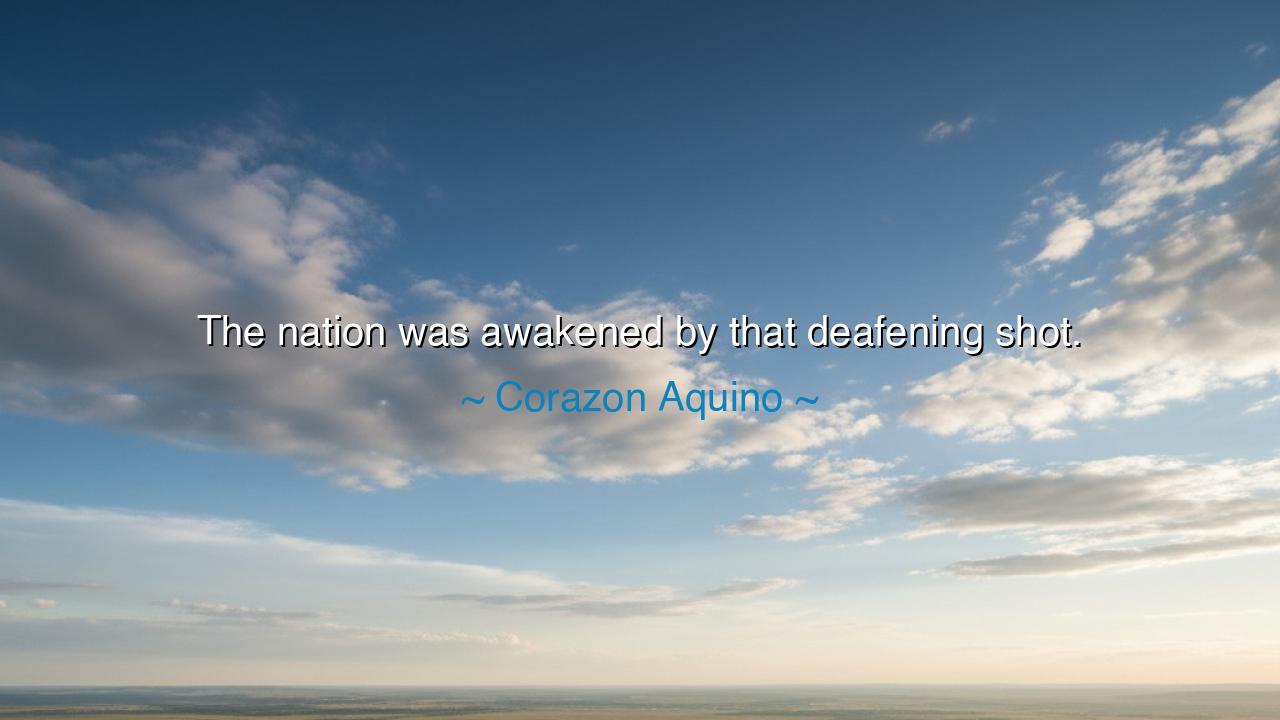
The nation was awakened by that deafening shot.






In the stirring and mournful words of Corazon Aquino, we hear the cry of a nation reborn through sorrow: “The nation was awakened by that deafening shot.” This is not merely a statement of history—it is a lament, a revelation, and a summons to conscience. Aquino, the first woman to lead the Philippines, spoke these words to describe the moment her country emerged from the darkness of fear and tyranny. It was the moment when a people long silenced by oppression found their voice once more. That “deafening shot” was not only the sound of death—it was the sound of awakening, of a nation remembering its courage.
The origin of this quote lies in the tragic assassination of Benigno “Ninoy” Aquino Jr., Corazon’s husband, on August 21, 1983. After years of exile, he returned home to a country ruled by the iron hand of Ferdinand Marcos, determined to confront dictatorship with the weapon of truth. Yet, as he stepped off the airplane that brought him back to his homeland, a gunman’s bullet ended his life. The shot that killed Ninoy Aquino echoed across the Philippines and throughout the world. It pierced not only the body of one man but the long-sleeping heart of a nation. And in that echo—loud, mournful, and unyielding—the people of the Philippines awoke to their own power.
When Corazon Aquino later said, “The nation was awakened by that deafening shot,” she was not glorifying tragedy, but acknowledging the strange alchemy by which suffering becomes strength. For years, her people had lived beneath a shadow of fear—afraid to speak, afraid to resist. But the martyrdom of Ninoy shattered the illusion of safety under tyranny. It reminded them that silence, too, can be a form of death. That single gunshot, meant to extinguish hope, instead ignited it. It became the rallying cry for a movement that would bring down a dictatorship and restore the light of democracy to her land.
Consider the great revolutions of history, and you will find the same rhythm—the moment when blood and sacrifice awaken sleeping nations. The death of Archduke Franz Ferdinand sparked the First World War, reshaping the fate of continents. The cry of Crispus Attucks in the Boston Massacre stirred the American colonies toward independence. And in the Philippines, it was the death of Ninoy Aquino that roused a generation to reclaim their dignity. In every age, there comes a moment when a people, long subdued, are called by the voice of tragedy to rise. That is what Corazon Aquino meant—that sometimes it takes a single act of injustice, laid bare for all to see, to awaken the slumbering spirit of a nation.
The awakening she spoke of was not only political—it was moral and spiritual. The people remembered who they were: heirs to a long struggle for freedom, guardians of a sacred land, and participants in the divine work of justice. When they filled the streets during the People Power Revolution of 1986, they did so not with weapons, but with prayer, courage, and solidarity. Soldiers laid down their arms; nuns stood before tanks; ordinary men and women, once silent, spoke with the thunder of unity. The “deafening shot” that had once brought death now bore fruit in life and liberation.
Yet Aquino’s words are not confined to the Philippines alone—they belong to all humanity. They remind us that awakening often follows pain, that in every society there lies a line between complacency and courage. Too often, people sleep through injustice, lulled by comfort or fear, until tragedy shakes them awake. When corruption festers, when truth is silenced, when freedom erodes quietly, it is the duty of conscience to awaken before the next shot is fired. The lesson is clear: a nation that forgets its duty to justice will one day be forced to remember it in grief.
So, my children, let this story be both warning and inspiration. Do not wait for tragedy to awaken your soul. Open your eyes now to the sufferings of others. Speak when silence is demanded of you. Stand firm when fear bids you kneel. For every generation faces its own test, its own moment when the bullet of injustice is fired—not always with guns, but with lies, cruelty, or neglect. When that moment comes, remember the words of Corazon Aquino, and awaken—not in despair, but in unity, compassion, and resolve. For though the shot may echo in pain, it is through awakening that a people become free.






AAdministratorAdministrator
Welcome, honored guests. Please leave a comment, we will respond soon